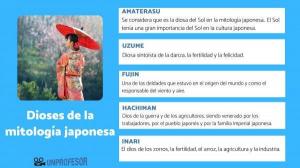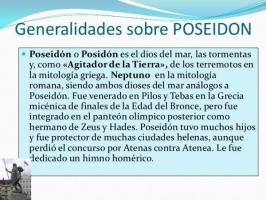The gods of Greek mythology
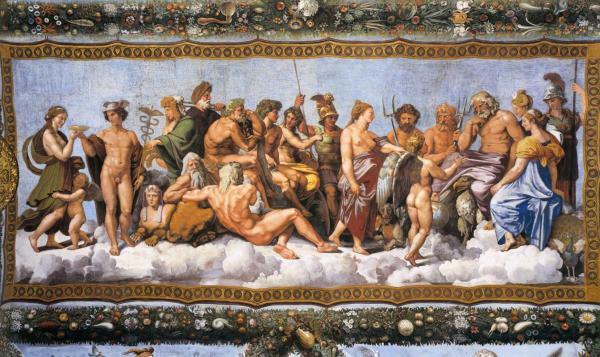
On ancient greece, the religion that its inhabitants had was based on a polytheistic mythology, that is to say that in Greek mythology we find several gods. Each of these gods represented the way in which the Greeks understood different aspects of his life, from the creation of the universe and the human being to the concepts of love and war.
The main gods of Greek Mythology were twelve, better known as "the twelve Olympians", since they lived at the top of Mount Olympus, the highest mountain in all of Greece, skimming the clouds. Of course, from such a high abode, the Greek gods controlled everything that happened in the lives of humans. The twelve Olympians, in Ancient Greece were called Δωδεκάθεον(Dodekatheon), literally "twelve" and "gods", and they were Zeus, Hera, Poseidon, Dionysus, Apollo, Artemis, Hermes, Athena, Ares, Aphrodite, Hephaestus and Demeter. In this lesson from a teacher we are going to talk to you about the most important gods of Greek Mythology.
Index
- The most important gods of Greek Mythology
- Zeus, the god of Olympus
- Hera, the goddess of Olympus
- Poseidon, the Greek god of the seas
- Ares, the god of war
- Athena, the goddess of wisdom
- Other important gods in Greek mythology
The most important gods of Greek Mythology.
The genealogical tree of the gods of Greek mythology is really extensive and it is normal to confuse who each one of them was and the relationships they had. Therefore, it is necessary to start by focusing on the most prominent characters, therefore, we must first know the twelve Olympian gods.
The twelve gods of Olympus, therefore the twelve most prominent gods of Greek Mythology, they gained the supremacy after winning the great war against the Titans and they began to render great cult to them in the 6th century BC. C., beginning in Athens. Although the main Greek gods were twelve, at different times some were changing, being the ten that were always constant Zeus, Ares, Poseidon, Hera, Aphrodite, Hephaestus, Apollo, Artemis, Hermes, and Athena, and the four most important who have always been variable Olympian gods were Demeter, Dionysus, Hestia, and Hades.
Perhaps Hades is one of the least included in the list of the twelve Olympian gods, since he had a complicated relationship with others, for being the king of the underworld and always being in it and not on the mountain Olympus. There were other prominent gods and goddesses who, sometimes although not very often, were part of the pantheon of the twelve Olympians, specifically They were Helios, Eros, Hebe, Selene and Persephone who, although they rarely had a place among the twelve, they were usually represented alongside these.
Do you want to meet the most important women in Greece? In this other lesson you will find the most important Greek goddesses.

Zeus, the god of Olympus.
To start talking about who the gods of Greek mythology were, of course, we must start with the main god, that is, Zeus, the supreme god. The story of Zeus god of Olympus, he begins by the importance of his birth, since he is the youngest son of the titans Rea and Cronos, so he is the brother of Hades, Hestia, Poseidon, Hera and Demeter. His duty is to control the destiny, justice and order of the universe, since he is Zeus god of the sky and of environmental phenomena such as rain, lightning and thunder. All this gives him great power and that is why he is the god of all gods and is the ruler of Mount Olympus.
He is considered the protective father of all gods and mortals and his symbols are the lightning bolt, the oak, the eagle, the aegis, the scepter and the balance. He was the brother and husband of Hera, but he had many lovers and had a very broad lineage with both goddesses and mortals. Some of the sons of Zeus were:
Sons of Zeus god of Olympus with goddesses:
- Children with Hera: Ares, Hephaestus, Hebe and Ilithia
- Children with Themis: Hours, Astrea and the Moiras or Fates: Atropos, Clotho and Láchesis
- Daughter with Metis: Athena
- Daughter with Dione: Aphrodite
- Children with Leto: Artemis and Apollo
- Son with Maya: Hermes
- Daughter with Demeter: Persephone
Sons of Zeus god of Olympus with mortals:
- Son with Alcmena: Heracles or Hercules
- Son with Danae: Perseus
- Son with Io: Épafo
- Children with Europe: Sarpedon, Minos and Radamantis
- Son with Electra: Dárdano
- Son with Callisto: Arcade or Arcas
- Children with Leda: Polux and Helena
- Children with Níobe: Argos and Pelasgo
Zeus is represented in full-length statues in a very majestic way, dressed only in the part below exposing his torso, accompanied by an eagle and with the scepter and / or the lightning bolt in his hands. The Romans identified Zeus as Jupiter, granting him all the attributes and power of Zeus, the supreme god of all the gods of Greek Mythology.
In a teacher we talk to you about Zeus wifeWell, this god had more than one.
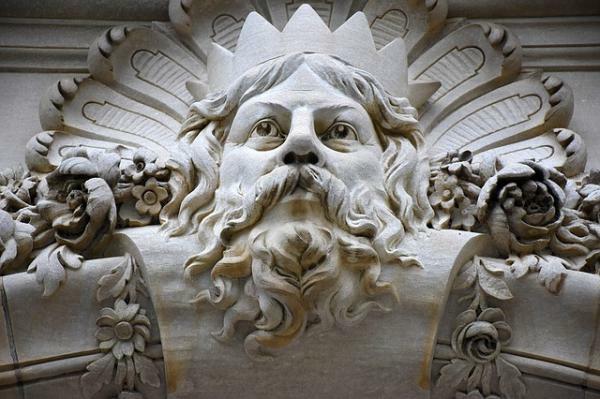
Hera, the goddess of Olympus.
Another of the most important deities among the gods of Greek Mythology, without a doubt, is Hera, the goddess of the family. The story of the Greek goddess Heraher, she begins as Zeus, she is the youngest daughter of the titans Cronos and Rea, so she was the sister of Zeus. In addition to being a sister, she was also the official wife of Zeus the god of Olympus and they had four children: Ares, Hephaestus, Ilithia and Hebe. Hephaestus considers himself the son of Zeus, but it is also believed that Hera conceived him herself.
Known as Hera goddess of women and marriage, she was the queen of the gods and of Mount Olympus, always considered the goddess of marriage, family and fertility. Being the goddess of marriage and family and being the consort of Zeus, she was jealous and always tried to take revenge on her husband's lovers and her children. The symbols of the Greek goddess Hera they are the peacock, the cow, the lion, the cuckoo, the crown and the pomegranate. In art she is represented full-length and fully clothed, with a crown or diadem on her head and a scepter in her hand. The Romans identified Hera as the goddess Juno, assigning her all the attributes of the queen of the gods of Greek mythology.
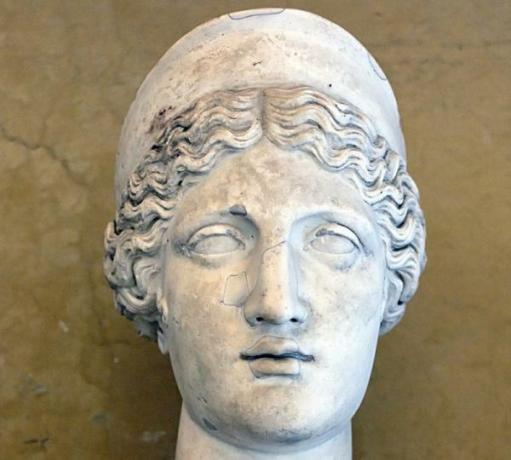
Poseidon, the Greek god of the seas.
The god Poseidon He is one of the main gods of Greek Mythology, brother of Zeus and is known as Poseidon, god of the seas, horses and earthquakes. He is a god of strong character and moody, even violent, to such an extent that his brother Hades, the king of underworld, he fears that one day, Poseidon god of waters, will break the earth above his kingdom as he crosses the seas.
He married the nereid Amphitrite, although she had many lovers, with whom he had a son, the son of poseidon better known, Triton. He had more children with many other lovers, but one of Poseidon's lovers who is important stand out was the gorgon, monster and female deity, Medusa with whom he had her son Pegasus, the winged horse. Find out here who is medusa, one of the most prominent characters in Greek myths.
In art he is represented as a majestic but wild, strong and swift figure, with a trident and often alongside a dolphin or in a chariot drawn by sea monsters. The Romans identified Poseidon, the god of Olympus, brother of Zeus, the supreme god of the gods of Greek Mythology, with the god Neptune.
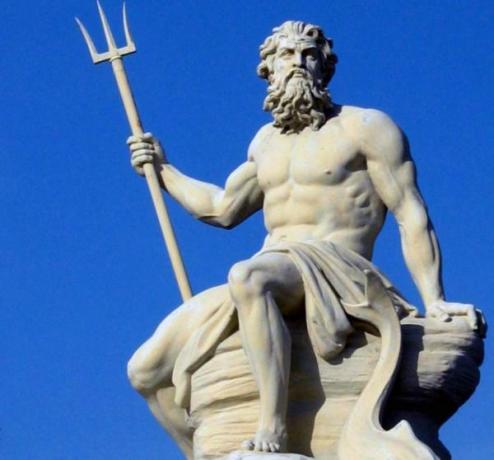
Ares, the god of war.
Another important god among the gods of Greek Mythology for being one of the outstanding twelve Olympians is Ares god of war, bloodshed and violence, he is the son of Zeus and Hera and lives with the Amazons, who are his offspring. Unlike Athena, goddess of strategic, tactical and noble warfare, between functions and the characteristics of Ares god of war is to be a bloodthirsty god, aggressive, terrifying, thus representing the most brutal and harsh nature of battles and war. He was always accompanied by the lesser deities, Phobo (Terror) and Deimo (Fear).
He was a god little loved among mortals since he enjoyed and delighted in the suffering and pain of the victims of wars, for this, all the gods of Greek Mythology despised him except for Aphrodite, his lover. His symbols are the snake, the dog, the wild boar, the vulture, the shield and the spear. In art we find him represented as a young man dressed as a Greek soldier, with cuirass, shield and helmet or, sometimes, helmet. The Romans associated the Greek god Ares with the god Mars, the Roman god of war.
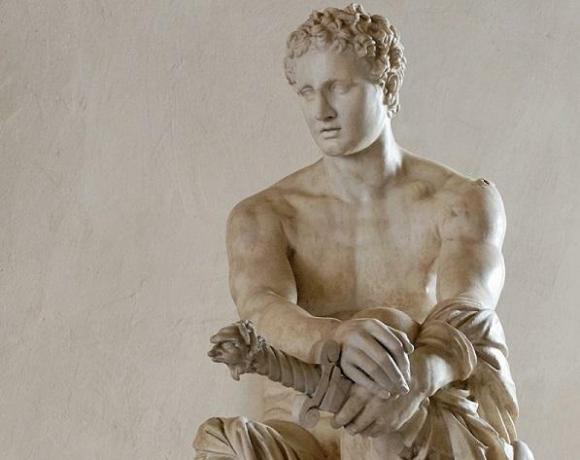
Athena, the goddess of wisdom.
Another female deity that must be highlighted among the gods of Greek Mythology is Athena, the goddess of Olympus. Athena's story she begins by saying that she was the daughter of Zeus and Metis, an oceanid, daughter of Ocean. Her father Zeus swallowed her mother Metis when she was pregnant and afterwards Athena Greek goddess of strategic warfare, she was born from the head of her father as an adult and dressed in armor, ready for war, becoming the favorite daughter of Zeus.
The city of Athens bears this name because the goddess Athena was its protector. Furthermore, she was also the goddess of reason, wisdom, defense, and craftsmanship. She was considered a protective and peaceful goddessher, since she always preferred to avoid wars before waging them. As she was a goddess who kept herself pure, she was nicknamed "the virgin goddess." She was often associated with the lesser goddess Nike, the goddess of victory, who almost always accompanied her.
The symbols of the Greek goddess Athena were mainly the olive tree and the owl, for this reason in art she is sometimes represented accompanied by these elements. She was represented as a virgin with a beautiful and severe face with a beautiful and strong body, wearing armor with a helmet, shield and long spear. In Roman culture the goddess Athena was identified as Minerva, who was awarded the characteristics and powers of Athena, the favorite daughter of Zeus supreme god of the gods of Mythology Greek.

Other important gods in Greek Mythology.
The previously discussed Greek gods were some of the most prominent deities in Greek Mythology, but other gods of Greek mythology that were important They are:
- Hephaestus: he god of fire and metallurgy, so he was the craftsman of the gods and made weapons and armor for them.
- Apollo: the twin brother of Artemis, protector god of medicine, music and the art of archery. He known for being the one who convinced the gods to punish mortals who committed blasphemous and impious acts. For these reasons, Apollo god of Olympus is also very prominent among the twelve Olympians.
- Aphrodite: she is the daughter of Zeus and the oceanid Dione. Considered the Greek goddess of love, desire, sensuality and beauty, married to Hephaestus but a lover of Ares and many others. The Romans identified Aphrodite with the goddess Venus.
- Hermes: he is the god in charge of being the messenger of the gods and considered the god of thieves and commerce. As his main function was messaging, he is known as Hermes the messenger god. He is the son of Zeus and the nymph Maia and is distinguished by wearing winged sandals and a helmet, for this he is also attributed the name of the winged god Hermes.
- Sagebrush: the twin sister of Apollo, daughter of Zeus and Leto. She is a virgin goddess so she represents virginity, but she is also the goddess of hunting, archery, animals, and childbirth.
- Demeter: she is the Greek goddess of agriculture, nature, the seasons and fertility, daughter of Cronus and Rea and sister of Zeus. The Romans identified her with the Roman goddess Ceres.
- Hestia: Among the characteristics of Hestia Greek goddess we find that she is the sister of Zeus and goddess of the family and the domestic order, so she is She well known as Hestia goddess of the home, she stayed on Olympus when the other gods went to war, since she never went to battles.
- Hades: he god and king of the underworld, of the dead and of material wealth. He is one of the gods of Greek Mythology who is not usually included among the twelve Olympian gods because he lives in the underworld. She took Persephone and made her her wife.
- Dionisio: god of celebrations, ecstasy, wine and the art of theater. He was the son of Zeus and the princess of Thebes, Semele, being the only Olympian god born to a mortal. He is well known as Dionysus god of wine and as Dionysus god of pleasure.
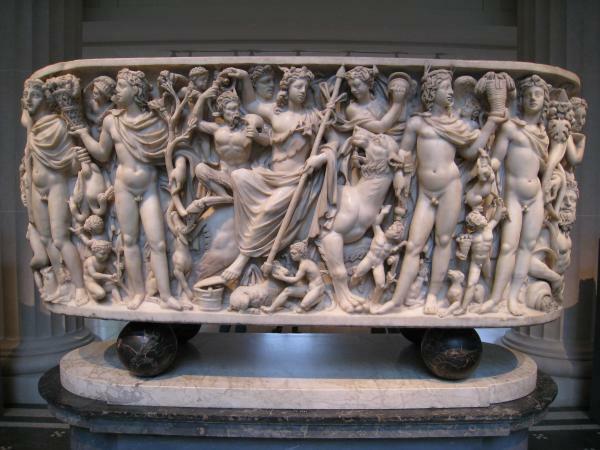
If you want to read more articles similar to The Gods of Greek Mythology - The Most Important!, we recommend that you enter our category of Story.


